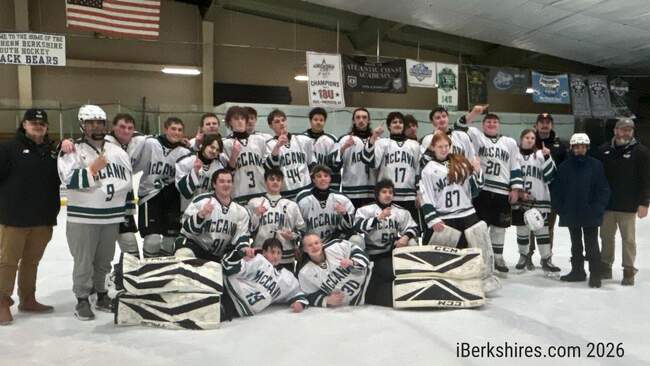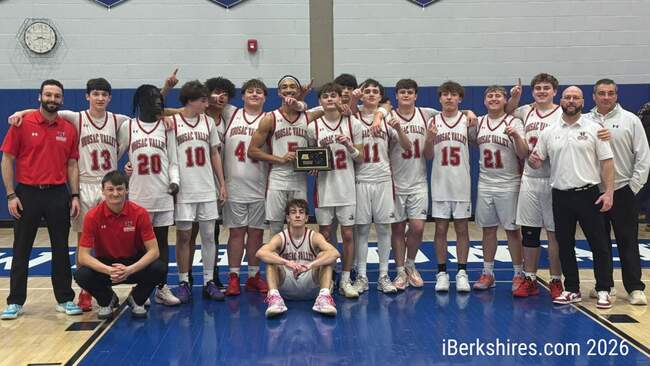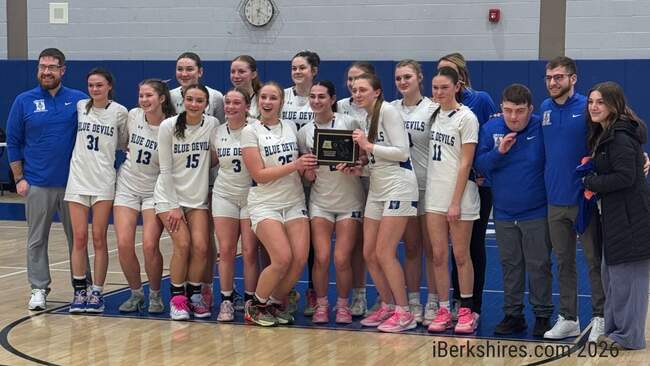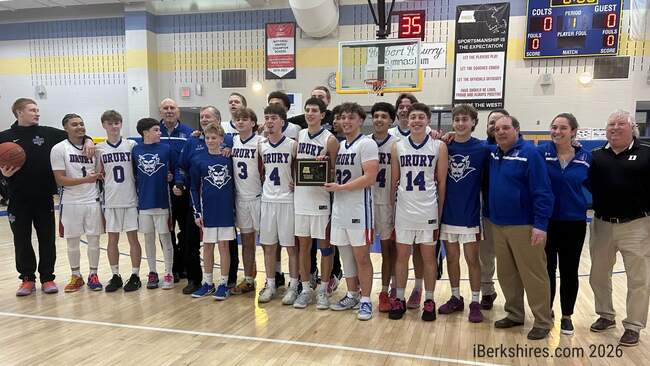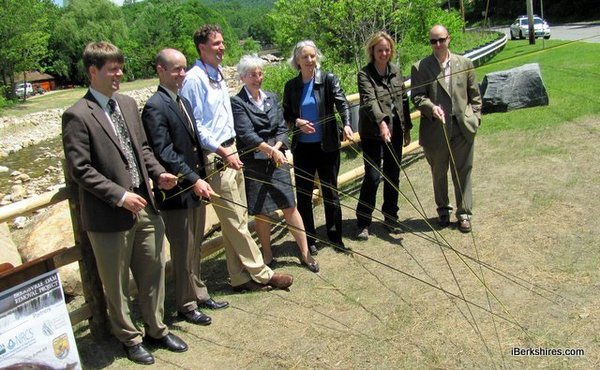
Federal, State Officials Mark Clarksburg River Restoration


CLARKSBURG, Mass. — The fish weren't biting on Friday despite the sure-fire flies from Trout Unlimited.
Maybe the trout and long-nosed suckers were taking it easy amongst the eddies and pools created along the Hoosic River, ignoring the the yellow lines being ceremonially cast from the bank by a bunch of government types.
A year ago there were no pools, no riverbank and few fish, if any, in the slight elbow of the North Branch. There was an old dam and a river so silted up there were trees growing in the middle of it — nice shade for the picnic table some enterprising explorers dragged out there.
Now the water runs free — thanks in large part to those very government officials, environmentalists, educators and the old dam's owners who gathered on Friday to mark the Briggsville Dam's demise. It was a coalition of 18 diverse partners committed to restoring a river in the name of safety, ecology and economics that removed the obsolete dam and restored a wildlife habitat for fish and wildlife along 30 miles of river.
"I think you are a model for what 21st century conservation looks like going forward," said Ann Mills, deputy undersecretary of the U.S. Department of Agriculture, who added that this "is exactly the kind of story that I will be proud to tell."
Mills oversees USDA's Natural Resources Conservation Service, which provided nearly $400,000 toward the more than half-million-dollar project. The balance was made up by Cascade School Supplies, the town of Clarksburg and public and nonprofit agencies.
The project is part of the Obama administration's America's Great Outdoors Initiative, which was launched two years ago with a meeting of some 500 leaders in business, ecology and education and other fields. Some 50 listening sessions across the nation has resulted in 100,000 comments and a plan of action that will encourage communities to leverage their natural resources with the help of federal and state agencies.
Mills said what was taken from the listening sessions was that "Americans deeply care about their natural resources and they want to preserve them and they understand the connection between a healthy environment and a strong economy."
This project was a "classic story of success" because it saved both the river and a local business, Cascade School Supplies, which had a direct affect on some 150 jobs.
"This was the literal breaking down of a barrier that's going to usher in a really healthy and important era," she said. "This is a good example of how in working together to protect a resource you can also protect — literally in this case — a number of jobs in communities across the country."

The dam hadn't been used for power in decades when Cascade purchased the mill building several years ago.
"When Cascade first learned we would be faced with the financial challenge of repairing or removing the dam, we were quite concnered about how we could possibly fund such a large endeavor and still remain a fiscally viable company," said Cascade President Peter Cote. "Thanks to all the people and organizations here today, that became a reality."
There are some 3,000 aging dams in Massachusetts and 26,000 in the Northeast, said Brian Graber of the nonprofit American Rivers, which has been spearheading river restoration through dam removal.
"These dams are deteriorating, and as they deteriorate, they are becoming financial burdens to their owners and in many cases they're becoming public safety hazards," said Graber who with Nick Wildman, priority projects coordinator for the state Division of Ecological Restoration, was instrumental in moving the project along. "We've recognized that there's really no better, or faster, more effective way to bring rivers back to life than to remove a dam."
The project almost didn't happen when the complex plan of grants and donations ran into deadline issues and drying up resources last spring. But the 160-foot-long dam that dated back to 1848 was finally removed last November, the channel dredged, boulders put in place and the restored banks re-seeded. All that's left of the detiorated concrete structure is a rusting set of gears made by Rodney Hunt Machine Co. in Orange to provide mechanical power to the former Strong-Hewat Woolen Mill.
Town Administrator Michael Canales described the gears and chutes "as a bookmark" as the area turned a page from the mills and businesses that flourished with the power of the river back to what it was like hundreds of years ago.
Joe Overlock of the Hoosuck Chapter of Trout Unlimited, who later gave Mills tips on fly casting, said the river was stocked with brown, brook and rainbow trout. He envisioned benches in the newly created park area and a catch-and-return month as a way to foster use of the restored fishing spot.
Also speaking were state Sen. Benjamin B. Downing, D-Pittsfield, state Rep. Gailanne Cariddi, D-North Adams, master of ceremonies Tim Purinton of the state Division of Ecological Restoration (who called it "an incredibly enjoyable project" despite the difficulties) and state Fish & Game Commissioner Mary Griffin.
Griffin read the governor's proclamation of National Rivers Month and presented copies to project leaders. She spoke of conservationist Aldo Leopold, who advocated decisions that benefited the whole community — land and water, people and wildlife.
"This project is kind of the ultimate example of that: it benefitted business, benefitted the environment, and it brought together tremendous partners to carry that out," she said. "So I think the father of the modern conservation movement ... would be very proud of us today."
Public and private partners on the project were USDA Natural Resources Conservation Service, U.S. Fish and Wildlife Service, Massachusetts Division of Ecological Restoration, Massachusetts Division of Fisheries and Wildlife, Town of Clarksburg, American Rivers, Hoosuc Chapter of Trout Unlimited, Massachusetts Corporate Wetlands Restoration Partnership, Hoosic River Watershed Association, Massachusetts College of Liberal Arts, Sweet Water Trust, Wildlife Conservation Society, Cascade School Supplies.
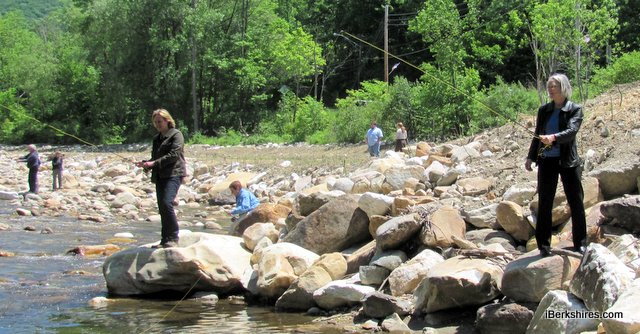
|
|
Briggsville Dam Deconstruction at Halfway Mark CLARKSBURG - 11-04-2010 - "It's been six years coming to fruition and now that it finally has, it's a tremendous relief." — |
|
|
Clarksburg Dam Demolished Thursday CLARKSBURG - 11-02-2010 - The project involves removing the dam, stabilizing and vegetating banks, protecting an upstream bridge, and restoring... |
|
|
Dredging Begins at Clarksburg Dam CLARKSBURG - 10-25-2010 - Some 11,000 yards of rocks and sediment behind the dam will be excavated before the concrete structure is removed. |
|
|
Clarksburg OKs Funds for Dam Removal CLARKSBURG - 10-06-2010 - Nick Wildman, priority projects coordinator of the state's Division of Ecological Restoration, said the work could... |
|
|
Clarksburg Officials Look For Voter Guidance on Dam CLARKSBURG - 09-22-2010 - "It's your money folks. We need your vote; we need you to tell us what to do." — Selectman Carl McKinney |
|
|
Clarksburg Sets Vote on Dam Spending CLARKSBURG - 09-17-2010 - The town meeting will be held on Wednesday, Oct. 6, at 7 p.m. at the Clarksburg Elementary School. |
|
|
Clarksburg Looks For Dam Removal Alternatives CLARKSBURG - 08-25-2010 - The town may turn to the Pentagon to get rid of the deteriorating Briggsville Dam. |
|
|
Clarksburg Could Vote on Dam Removal CLARKSBURG - 08-02-2010 - "It's either going to have a lot of support and pass or it's going to go down in flames but it won't be for lack of... |
|
|
Clarksburg Selectman Suggests Town Vote On Funding Dam... CLARKSBURG - 06-24-2010 - "You can basically expect the mill to go out of business and to remain vacant and no longer pay property taxes. And... |
|
|
Clarksburg School Asks Town to Help Close Shortfall CLARKSBURG - 04-16-2010 - "You were at last year's town meeting. I really don't want to ask for more." — Chairwoman Debra Lefave. |
|
|
Briggsville Dam Slated for Removal This Summer CLARKSBURG - 02-25-2010 - "From a fish standpoint, we didn't want to come into this and pump the stream down." — Nick Wildman |
Tags: Briggsville, dam, USDA,

